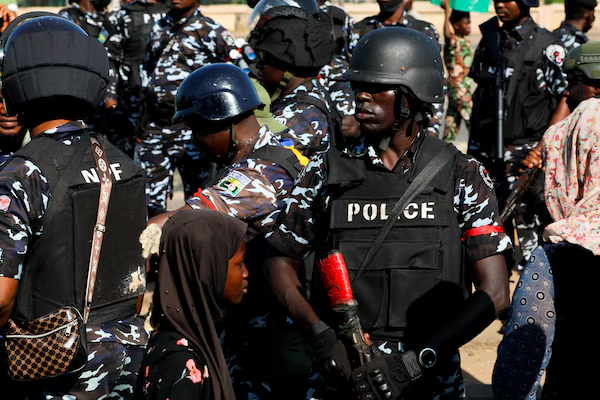Nigerian security forces fired bullets and teargas at several journalists and protesters on Saturday during demonstrations against the country’s economic crisis in the capital city, Abuja. The incident, witnessed by journalists at the scene and captured in videos reviewed by The Associated Press, marks a concerning escalation in the ongoing protests that have gripped the nation for three days.

While it remains unclear whether the projectiles fired were rubber or live rounds, the aftermath of the attack was evident. Bullet holes were observed in a car belonging to one of the journalists, and live bullets were found at the scene of the protests. The violent response from security forces has raised alarm about the safety of both protesters and media personnel covering the events.
Amnesty International’s Nigeria office reported that at least 50 protesters were arrested on Saturday in Abuja alone. The Nigerian police stated that nearly 700 protesters have been arrested across the country since the demonstrations began, while nine officers have been injured during the unrest.

The protests stem from Nigeria’s worst cost-of-living crisis in a generation and widespread accusations of misgovernment and corruption. The demonstrations highlight the stark contrast between Nigeria’s public officials, who are among the best-paid in Africa, and the country’s population, which includes some of the world’s poorest and hungriest people despite Nigeria being one of the continent’s top oil producers.
At the Nigerian national stadium, where dozens of protesters had gathered, police officers were seen firing tear gas to disperse the crowd. The situation escalated when hooded operatives, believed to be from the Nigerian secret service or Department of State Service (DSS), arrived at the scene. According to multiple eyewitness accounts and video evidence, these operatives quickly dispersed the protesters and then fired gunshots at journalists who were still present.
Journalists at the scene reported that they were clearly identifiable as media personnel, wearing vests with media branding and positioned near vehicles with media logos. Despite this, they found themselves targeted by the security forces. Abdulkareem Mojeed, one of the journalists attacked, described the shocking nature of the incident, noting that at least three bullet holes were found in his car.

The DSS, known for its reputation for brutality, has frequently been accused of violent attacks and wrongful arrests. When contacted, a spokesperson for the secret service did not respond to inquiries from The Associated Press regarding the incident.
This attack on journalists is not an isolated incident in Nigeria. The country ranks 112th out of 180 countries in the latest World Press Freedom Index by Reporters Without Borders. According to the West Africa-focused Centre for Journalism Innovation and Development’s (CJID) press attack tracker, at least 31 cases of attacks against journalists, including 11 arrests, have been recorded since the cost-of-living protests began.
Adebayo Aare, a project officer on media freedom with CJID, expressed concern over the security officials’ conduct, suggesting that they appear to be deliberately targeting journalists rather than providing security for them.
The Nigerian police have reported that seven people have died during the protests, asserting that none were killed by security forces. However, Amnesty International claims that at least nine protesters were killed by security forces. In a statement calling for an end to the planned 10-day protests, police spokesman Muyiwa Adejobi also mentioned that an officer previously reported as dead had “miraculously survived.”
apnews.com



